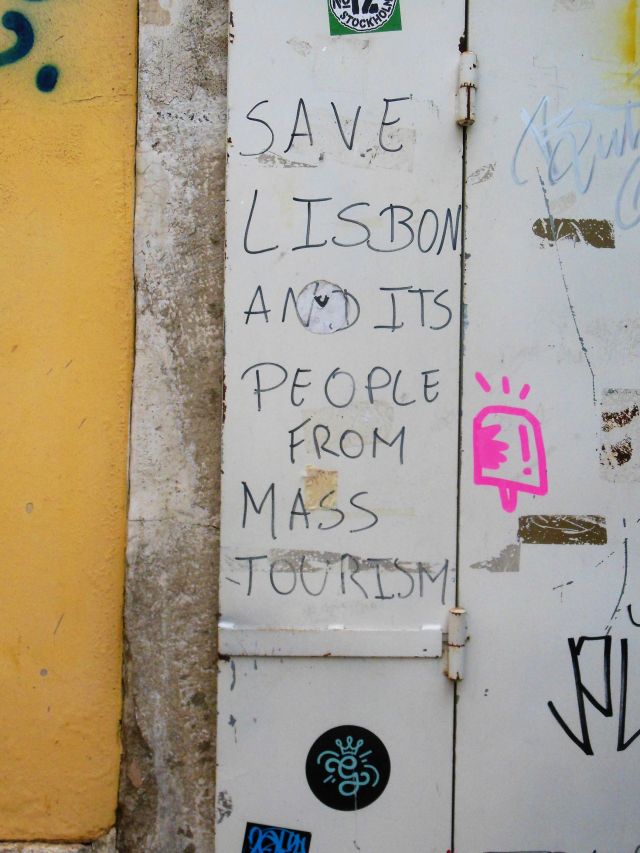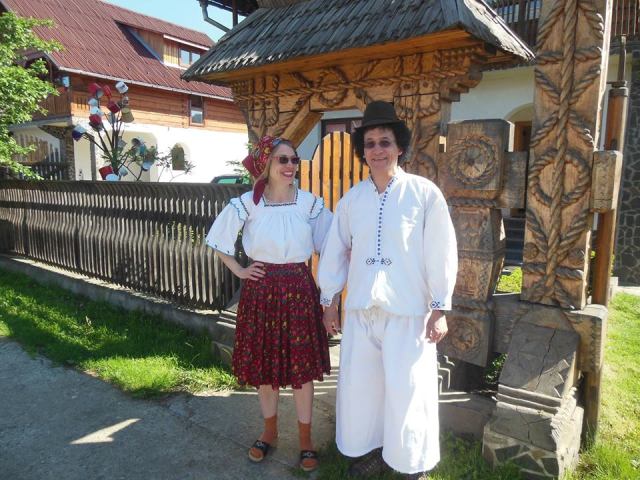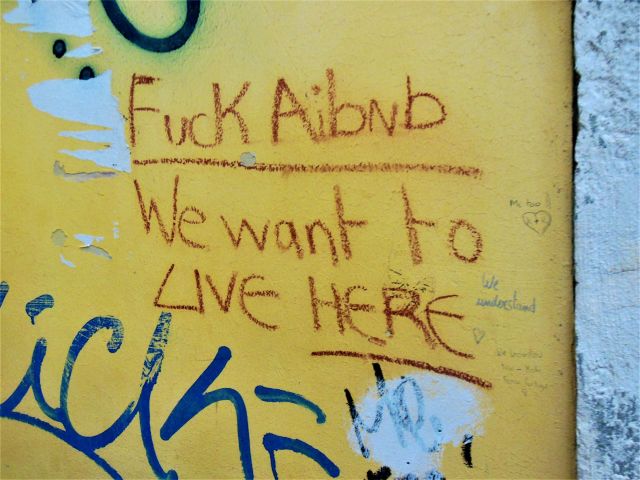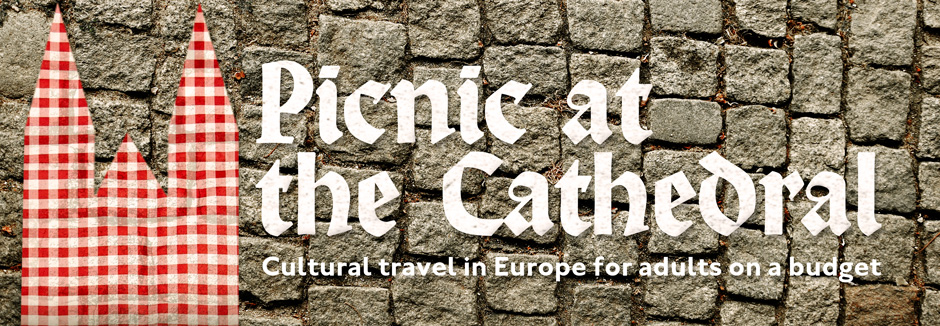Growing up in the rural Midwest, I lived for several years in a resort for well-off city dwellers. (My mom had remarried and some of my stepfather’s family owned and operated the place, and for a while he worked there too.) The resort had artificially created lakes, golf courses, a concrete castle, and hilly roads with vaguely Native American names.
I didn’t hate this resort, in fact I relished the chance to meet what seemed to me thrillingly sophisticated city kids. I did, however, loathe the Trunk-Slammers. While some owners—mainly retired folks—lived year round, most people would come on weekends, summers and holidays. The Trunk-Slammers were weekend warriors known by that name because they drove in, pulled noisy stuff out of their car trunks, made a lot of noise, packed the noisy stuff back in their trunks, slammed those trunks shut and left two days latter. Trunk-Slammers rode ATV’s through wooded areas, ripping up wildflowers, ferns and the habitats of wildlife. They tore through the lakes on speedboats and jet skis, polluting the air and water with noise and diesel fumes. Trunk-Slammers were in “the country”, where it meant they didn’t need to respect anyone else and they could do stupid stuff they would never do at home, like walk in the middle of the road and drive snowmobiles over thin ice.
These days I’m a bit of a weekend warrior myself: with trips averaging 10 – 14 days, HOB and I will pursue a hectic itinerary through the country we’re visiting, a day or two in a town and then zip the backpack up and on to the next. While I may be a weekend warrior, I am not, of course I’m not, a Trunk-Slammer. I mean, I don’t even drive and I carry everything in a small backpack. But….well, after our last trip I’m starting to worry I could be a cultural Trunk-Slammer.
This past fall we rented an apartment in the Alfama neighborhood of Lisbon, described in our guide book as a deeply authentic, working class district full of undiscovered back streets and soulful fado music. Well, Alfama did have innumerable backstreets, every last one of them jammed with tourists. In the balmy evenings sounds of fado drifted from tiny bars, each one of them filled with tourists. Gorgeous young women strummed guitars for tourists. When we unlocked our apartment the couple checking in below us were also tourists.
Oh, and the important part: we were tourists. We were paying the Airbnb rents, making it more economically viable for Marta (our landlord) to live outside of Lisbon than in the apartment she once occupied in that historic neighborhood.

Alfama neighborhood, Lisbon, Portugal
I mean, it isn’t like I never thought about this before (or tried really hard not to think about the environmental impact of all the flying we do). But I’ve felt okay about contributing to mass tourism because of how we participate in the local culture. We respect the religion, eat local foods, and seek out art, architecture and music. That makes it okay, right?
Right?
Maybe…not. It is possible that what HOB and I do when we travel is the cultural equivalent of driving an ATV through the wildflowers in someone’s backyard. Let’s say I’m inside some temple, awkwardly holding incense and bowing, leaving offerings for a god I don’t know the name of—am I edgy and open-minded, or just getting in the way of a local person’s spiritual experience? I like to think I am an expert in short-term cultural immersion but perhaps culture is not meant be tried on like a costume.

Vadu Izei, Romania
I also occasionally wonder if my “authentic” travel experience is a performance put on by locals who are themselves trying to please tourists seeking out authentic culture. This was certainly the case when we stayed at the farm of the Bunan tribe in southwest Taiwan. The tribe members really do live and work on that farm, but they probably don’t actually want to run though their millet harvest song and dance routine every afternoon at 2:00 pm. On the other hand, by promoting and delivering these cultural experiences to tourists like us, the Bunan tribe are able to live self-sufficiently on their own terms and I applaud them for it.

Bunan Farm, Luye, Taiwan
Perhaps the search for authentic culture is a problematic concept that could lead to cultural Trunk-Slamming. I often remind myself that tourists believe Chicago locals love eating hotdogs and stuffed pizza and that we are all crazy for sports, while I, a 25 year resident of Chicago, couldn’t tell you the last time I ate a hot dog, find eating stuffed pizza to be like swallowing a bowling ball, and have never attended a single professional sporting event the entire time I’ve lived here. By all means, visit Chicago and choke down a few hot dogs while screaming at a sportsball game but please don’t think that has anything to do with my life. (This reminds me of a time we shared a freezing cold guest house on a mountain in Georgia with a German couple. In learning they came from Leipzig, HOB and I were overjoyed to share with them our love of their traditional hometown music: Bach sung by an 800 year old resident boy’s choir. The German couple finally confessed “We’ve never heard that boys choir—we listen to electronic music.”)

Zwarte Piet decoration in Ghent, Belgium
I may be a cultural Trunk-Slammer but I recognize that authentic culture does not necessarily equal good culture. While bullfighting is a genuine cultural phenomenon in Spain, I would not support this disgusting and cruel tradition as an audience member. And the next time we travel in Belgium on December 6th, we’ll turn our backs on the festivities surrounding Santa’s blackface helper, Zwarte Piet.
The solution to cultural Trunk-Slamming in not staying home. My job relies on tourism and I genuinely enjoy most of my tourist customers, particularly the curious ones who work a bit harder to engage in the complex and myriad cultural offerings of Chicago. And anyway, regardless of my feelings about them, if those tourists stay home, who pays my salary?
We’re still going to have to be blitz travelers, given the reality of limited vacation time and of course, limited funds. What I can offer the residents of the places we visit is the same curiosity I like to see in Chicago tourists along with the recognition that their culture is complicated. As much as I like to see people singing and dancing in colorful national costumes, I realize that an equally authentic local experience is eating mediocre Chinese food in a strip mall in rural Italy. And though I feel uncomfortable about Airbnb, we’ll continue to stay in them (hello kitchen and washing machine!) Anyway, it is patronizing to assume that every local is somehow mourning for their authentic apartment in the historic area. That apartment we rented from Marta in Lisbon? It was tiny with a ridiculous shower. Perhaps Marta prefers staying in a more comfortable place in the suburbs anyway: if I were less of a cultural Trunk-Slammer, I would have stuck around and asked.

Alfama neighborhood, Lisbon, Portugal


Interesting perspective.
I understand what you are getting at but feel that we are also contributing to their economic well being. Also and I think very importantly by being respectful of the culture we are visiting we greatly avoid the the risk of being a trunk slammer (great term).
LikeLiked by 2 people
Yeah, you really have to feel for countries like Egypt right now who are experiencing a downturn in tourism—it must be financially devastating to those in the tourist industry.
I’m not sure if my family made up the term Trunk-Slammer or if that was something other people said. There was a self-organized group of resort residents who would patrol the resort looking for god know what crime (they would always slow down in front of our house because we were scandalous and me and my mom would dance in the window when we saw them coming). We called them the Mobile Nazis.
LikeLiked by 1 person
Night thoughts of a tourist. You’ve got them down perfect.
I can’t sleep when I think of the amount of CO2 released by airplanes I’ve traveled in until I remember that just one of the data centers run by google (or any other similar company) takes as much electricity as all of Sweden used to use in the 1990s. I’m okay with traveling in packed aircrafts, so that the CO2 is spread among a larger number of people. Also I have friends who fly much more frequently on work.
As for tourists displacing locals, St. Michel used to be such a wonderful part of Paris when I was a student; cheap cafes, lots of other students; the left bank used to mean the left bank, not hordes of tourists looking at each other. But then I was happy to meet a waiter at a cafe who could talk to me in broken Hindi because he’d just traveled through India. The wonderful small restaurants I knew from those times have either closed down or now serve trashy versions of French food because their only customers are people who will never come back for a second meal.
So I’m completely with you, especially when a big meal on the road keeps me awake at 3 in the morning.
LikeLiked by 4 people
Greetings fellow insomniac! I like your story of meeting a waiter who knew broken Hindi from traveling in Paris. I wish I knew the left bank back in the glory days—all I’ve ever seen are the trashy food places filled with midwestern tourists who look like me.
LikeLiked by 1 person
Thought-provoking! And a little bit guilt-provoking! But I tend to think overpopulation is a bigger problem than tourism. Also I see how my (adopted) hometown of Steamboat Springs depends on tourism. It would just be a dusty little ranching community if it did not have a great ski mountain that was developed in the 60s. Now of course as a local I breathe a sigh of relief in the spring and fall off-seasons, but the tourists/skiers keep things vibrant for all of us. Of course, I know the pioneers displaced the Native Americans who had their own earth-respecting culture before the pioneers arrived. Endless food for thought, I guess.
LikeLiked by 1 person
It is pretty weird though, how some places—like Albania—seem super depressingly underpopulated even through they are as lovely as nearby overpopulated places. We went to a museum in Albania where we were the first visitors in a week and that was horrifying!
I’ve never been to Steamboat Springs but Colorado is such a wonderful place for hiking and nature, though I leave the skiing for the more coordinated folks.
LikeLiked by 1 person
You are such an adventurous traveler, and always seeking out art in situ. I guess that takes you to out-of-the-way places. We should all do it! As for snow sports, just this year I’m transitioning from snowboarding to cross-country skiing and snowshoeing (nothing to do with my age, of course). Come visit sometime!
LikeLiked by 2 people
Well written! The situation is the same or much worse in Venice – many residents are fighting for their own lives. I was disappoint to know that Lisbon is not what it was ten years ago, but I am one of the trunk-slammers and contributors…. I am anxious when huge number of people access my certain post, wondering they might cause troubles at the destination…..
LikeLiked by 2 people
Hey thank you. Perhaps we should just think of Venice as a kind of living museum and not as a normal city and then the crowds are easier to tolerate (for us, if not for the poor residents!)
LikeLiked by 1 person
Lots of food for thought here, thank you. My immediate reactions all come back to clichés about travel, I’m afraid.
1. “Travel broadens the mind.” Clearly it does for you both, but it rarely does for a large proportion of tourists who go for an experiential visit without necessarily changing their point of view or strongly held opinions-slash-prejudices. Sadly, tourist hotspots seem to be proliferating to accommodate preconceived expectations.
2. “Destroy what you came to see.” Tourism can encourage the same processes that lead to people building houses in a beauty spot—they want to enjoy a view or amenity, but by doing so they (a) spoil the pristine situation for everyone else and (b) set a precedent for others to do the same. Once a tourist or two arrive somewhere beautiful or historic or isolated or ‘undiscovered’ the postcard sellers, fast food franchises, coach parks and cruise ships prove not far behind.
3. ‘Top secret holiday destinations.’ Somebody forget to explain that when you reveal a secret it’s no longer a secret. And when that ‘secret’ is revealed online or in mass circulation or broadcast media it’s the kiss of death for that ‘unspoilt’ destination.
My solution would be to vet all wouldbe travellers: ‘What is your purpose in visiting this site/place/destination?’ Unless a valid reason is given I would ban them, and my decision would be final. A bit Genghis Khan, I know, but there you are. (You too would be an exception, of course! I’m all for vicarious travel!)
LikeLiked by 2 people
I’ve a skeptic of that “travel broadens the mind” clique too. Some of the most broad minded people I’ve ever met haven’t traveled much and many of the well traveled are entitled, provincial jerks.
Your Genghis Khan vetting technique is quite entertaining. I honestly would have to answer the “What is your purpose in visiting/” question with “Excessive snacking and laughing at street signs and medieval paintings of the baby Jesus.”
LikeLiked by 1 person
😄
LikeLiked by 1 person
Yes lots of food for thought……and it’s only going to get a whole lot worse, as we found out when we went to a certain part of Italy.
LikeLiked by 2 people
Oh dear! What places in Italy did you find were the worst?
LikeLiked by 1 person
Cinque Terre, the five villages, that look like they are toppling into the sea on the Italian Riviera, a Unesco site…… hundreds and hundreds of tourist, us included, We had no idea that amount of people would be there……and the reason, the huge cruise ships that come in to La Spezia, just along the coast. They are lovely villages and I am glad we went, but so disappointed, it would be better if there were timed visits, you could really hardly see the beauty of the them, let alone soak it in. I really wanted to explore, but just got ratty and bad tempered, although I did find one church that was not too busy. I will do a post, as we did a boat trip all the way along the coast…..ha ha best way to see them 🙂
LikeLiked by 2 people
That was a thought provoking piece….if the lady has a better life in her terms by renting out her flat how does that balance inflicting endless tourists on her remaining neighbours…
LikeLiked by 2 people
Salient point—we have rental restrictions in our building which I am strongly in favor of for this reason. .
LikeLiked by 1 person
In 2017 I visited Aralsk, once on the shores of the Aral sea. I since long wanted to go there, but always felt a bit, umm, guilty about it; it wasn’t trunk-slamming, a locution that I didn’t know and now utterly adore, but I felt a bit of a voyeur of a private tragedy. However, I resolved that my reason in being there was to get to have an opinion for myself, based on my experience, and not on somebody’s (possibly distorted) news article. And it was an incredibly informative, multi-faceted experience.
Sure, there are downsides to tourism, there are issues with the impact it has on places such as Lisbon or Venice, but there are ways and ways of being a tourist. And, in the grand scheme of things, I think it’s unfair to match your way of visiting a place to the antics of the Trunk-Slammers.
As for AirBnb… as with most disruptive techs I bet that, in the long run, we’ll find a way for it to ‘blend in’. In some places it’ll work, in some place it’ll work less. But even hotels can be disruptive; am I the only one who finds odd that every other building in downtown Austin, TX, is a hotel chain?
LikeLiked by 2 people
Oh see, now I want to visit Aralsk too—-you are creating your own mini-wave of Trunk-Slammers. 🙂
The secret to staying in hotels is to pay close attention to the staff, like every single person who works there. There’s subculture in hotel employment that, if you recognize it, is a kind of authentic travel experience in itself. Plus, I love to feel anonymous sometimes. Ever stayed in an Ibis Budget? Bliss. Doubt if they have them in Austin though…
LikeLiked by 2 people
Ibis Budgets, in fairness, make me sad. They’re so full of fake French modernist style! But I see what you mean.
LikeLiked by 1 person
Great post! It’s something I’ve been thinking about recently too. I’ve realised that I view myself as somehow separate to ‘tourists’ and that I moan about how touristy somewhere has become, whilst I’m there, being a tourist, which is just ridiculous.There are certainly parts of the world that have become victim to travel fashion, fueled by social media, where you ‘have’ to go so you can take a picture of yourself to prove you were there. To me it seems more like a box ticking exercise than real enjoyment of the place. Although I’m not sure it’s a modern phenomenon, those on the Grand Tour were probably the historic equivalent of today’s Instagram kids, it’s just that more people now have the time and money to travel. The distinction between tourism that helps and tourism that hurts is such a tricky one. I’m not sure that there is an answer, but at least being aware that there might be an issue, is better than nothing.
LikeLiked by 1 person
A coworker of mine was telling me about a friend who recently traveled to Cuba. From her Instagram, you’d think she was having the time of her life, though when she returned she described a completely miserable experience. I think we’d all be better off admitting when something didn’t work out for us (not trashing the place, but our experience of it) then we wouldn’t be creating these unrealistic expectations and driving out of control tourism.
LikeLiked by 1 person
It’s very hard to be a responsible tourist these days. I use Airbnb but I hate what it’s doing to cities where locals can’t find affordable rents and I am under no illusion that staying there means that I am ‘living like a local’.
And I am so tired of going somewhere I’ve seen great photos of, only to find it is mobbed by mass tourism.
LikeLiked by 2 people
In terms of “mobbed by tourists” I’d say, including Lisbon, Prague and Dubrovnik were the worst.
LikeLiked by 1 person
Yes Dubrovnik is bad and Rome, Barcelona; a lot of European cities have the over tourism problem. Cheap flights around Europe add to the problem
LikeLiked by 1 person
If I lived in Europe I’d be on these budget flights all the time, so I can’t blame the people. But there seems to be a phenomenon of bro-ish guys, particularly Brits, using foreign locals as a place to get drunk and act rowdy on the weekends. It was particularly ugly in Prague, though you see it all over.
LikeLiked by 1 person
“Perhaps culture is not meant to be tried on like a costume”. Love that.
I was listening to an interview on Terry Gross (NPR). Her guest, Kevin Hart, a comedian who just Dropped out of hosting the Oscars, because of an off color joke he told ten years ago, gave a very interesting comment on culture.
He said we only know what we know, and it is when we get outside,of what is ,to us, familiar territory , that we learn what all is out there. And that is becoming cultured.
So, in a way the culture we enjoy when traveling is not only the native’s to clutch at and possess. In a way, it is also ours, to absorb, because otherwise we will go on being our petty, small minded selves.
LikeLiked by 3 people
I wish I could listen to Terry Gross—I love her show but I’m always at work when it is on.
That feeling of getting outside of familiar territory is my favorite. I’m addicted and while it comes with traveling, it happens at home to if you make an effort. Now I can’t claim that traveling has made me less petty. I get extremely envious sometimes, particularly of places with decent infrastructure and public transportation. And of course, I’m especially jealous of countries with great street food culture. In Taiwan—which has top notch infrastructure AND outstanding street food—I was positively seething with jealousy.
LikeLiked by 1 person
Well, we found out that next yr. Kyoto will impose a tourism tax on tourists since their city gets many millions of tourists and growing.
Barcelona another city we visited, has made headlines about its residents protesting on the massive daily crowds.
And Vancouver BC now gets over 9 million tourists annually, similar volume as Barcelona. Yea, you heard me.
Regardless of all that, we enjoyed Kyoto, Barcelona. It does help any tourist to have respectful curiosity and make effort to learn local culture and meet some locals. I always find those who go on animal safaris abit fascinating: it’s almost insulting not learn about local culture and people.
LikeLiked by 3 people
Wow I never knew Vancouver was so heavily touristed—now I must go immediately to see what all the fuss is about!
Really, what is the point of going someplace if you have no interest in the culture? Best to go to Epcot Center at Disney World instead.
LikeLiked by 2 people
Pm me any time about Vancouver, Gulf Islands..
LikeLiked by 1 person
I always love your writing. Regarding Airbnb – I wish people would stop using it. I’ve seen the damage it has done to too many places and I won’t stay there any more than I’d shop at Wallmart. Cheap hotels are available in most places that we travel, and we want these hotels to survive, don’t we? Okay, enough lecturing. Love your blog!
LikeLiked by 3 people
Thank you for your kind words. I agree with you for the most part, although I do have a relative (well past retirement age) who lives on the money she makes from renting her place on Airbnb. She’d much rather live in her house full time, but she doesn’t have much of an income otherwise so I get that it is good for people in her position. I do love a cheap hotel myself.
LikeLiked by 2 people
I think it is a good thing for people renting a room, in a place where they live, like your relative. I’ve stayed at Airbnb’s like that in the past. If it could be limited to those types of uses, I’d be all for it.
LikeLiked by 2 people
I really appreciate your honesty in this post. I also love the term trunk slammer.
We make such a conscious effort to really get an authentic experience abroad but sometimes it’s hard to tell. When we were in Sri Lanka we went to see the men who fish sitting on poles, everyone wants a photo. A local told us they aren’t even fishermen, they just pose like them for the photos and then take people’s money.
No one in the area actually fishes like that anymore apparently!
We do really enjoy homestays though. We get a home cooked local style meal and no one is acting, it’s just a local family. Often their kids want to practice some English which we are happy to do. Those are the authentic experiences and memories I crave.
LikeLiked by 3 people
We have also enjoyed homestays and I agree that the home cooked meals have been outstanding. I end up feeling quite attached to the children in the family, who are often quite interesting because they’ve grown up meeting people from around the world. The downside of homestays can be the lack of privacy, though that’s not always the case.
I’m jealous of your trip to Sri Lanka—I’d love to go, though when I do, I’ll know not to take photos of the fishermen on poles thanks to you.
LikeLiked by 1 person
There’s some very interesting conversations going on here. I have to admit to having travelled to some very picturesque and over-touristed spots, adding to the problem. I’m an Australian, and lucky to live in a place that’s so vast it’s not easy to overwhelm. We also take a bit of trouble to mitigate the impact of tourists, by eco-design, restricting visitor numbers to sensitive sites, etc.. but of course much of what’s to see here is natural. We go overseas to get our ‘culture’ hit…
LikeLike
Thanks for sharing a new perspective! I do believe, though, that the cultural norms are usually working the best at the time and place where they are practised. As you refer to bullfighting in Spain, there is just a minority supporting it these days, and it is not practised to the extent it used to be. However, in times the practice was popular, it was also acceptable to have slavery and have no human or animal rights whatsoever. Times change, peoples change, and traditional culture mirrors what’s left behind.
LikeLiked by 1 person
I was recently reading about Bull Dancing, which seems like it could replace bullfighting—keeping the danger, pageantry and tradition without the cruelty.
LikeLiked by 1 person